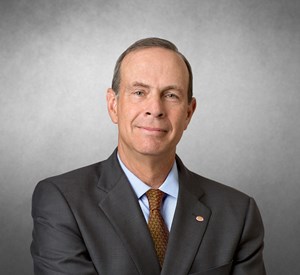Chevron, Oxy, Anadarko and the meaning of "winning"
NEW YORK (Bloomberg Opinion) -- If there’s one thing Chevron Corp. CEO Mike Wirth ought to do this week, it’s keep his story straight – even if that means letting Occidental Petroleum Corp. take Anadarko Petroleum Corp., by dint of changing its own story out of all recognition.
Wirth has until Friday to respond after Anadarko deemed Oxy’s bid for the company superior. It could hardly do otherwise: Oxy is now offering more than $76 a share. That’s a 23% premium to Chevron’s bid and, more importantly, contains $59 of cash, which on its own would more than cover Anadarko’s pre-bidding price of about $47. Throw in the Anadarko board’s governance own-goals and it simply couldn’t refuse Oxy any further.
Chevron has the wherewithal to raise. Adding another $7 billion or so of cash would get to $76, albeit with only about $31 of that being cash. On the other hand, Chevron’s stock is a more valuable currency than Oxy’s, in part because Anadarko represents a smaller mouthful for it. Even with the extra cash, Chevron’s pro forma leverage would rise to just about 1 times Ebitda , and that’s before any disposals.
Oxy, on the other hand, has had to get creative. It stretched, and effectively bid against itself, to get a “yes” from Anadarko this week, by boosting the cash portion to almost 80% of its bid. First, there was the left-field sale of $10 billion of preferred stock, plus warrants, to Berkshire Hathaway Inc. Then it was on to Paris to get an agreement from Total SA to buy $8.8 billion of African assets from the combined company if Oxy prevailed.
The latter was a smart move, covering more than half the disposals target for the deal and removing the headache of what to do with Anadarko’s liquefied natural gas development project in Mozambique. Even then, however, pro forma leverage would remain above 2 times Ebitda.
As for that resort to the bank of Warren Buffett: His cachet doesn’t come cheap. The 8 percent yield on the preferreds is way above Oxy’s pre-bidding dividend yield of 4.7% and equivalent to a pre-tax cost of debt of about 10%, roughly triple the company’s bond yield. That’s before counting the warrants, equivalent to 9% dilution on the pro forma share count, plus the redemption premium.
This wasn’t a bet on Oxy, the Permian shale basin or even oil prices; Buffett could have just bought stock in the open market for that. This was about extracting as much as possible from a company that really needed the promise of a big slug of cash.
Buffett’s cash also enables Oxy to issue less stock and, thereby, avoid having its own shareholders vote on the deal. This was a clear drawback from Anadarko’s point of view. Oxy CEO Vicki Hollub insisted on a call with analysts this week that she didn’t want to avoid a shareholder vote, but clinching the deal meant doing precisely that. Paying Buffett roughly double the dividend yield on Oxy’s common stock doesn’t exactly reek of confidence about how that vote might have gone down.
It is tempting to portray this as David taking down Goliath with a fancy slingshot, until one factors in how much David paid for the slingshot. Instead, this looks like the oldest story in the oil exploration and production anthology: the bold executive stopping at nothing to win their prize.
Having surprised many – me included – with its maneuvers these past couple of weeks, Oxy might in time show that acquiring Anadarko really was a “generational” opportunity, as Hollub calls it. What isn’t in doubt is that Oxy’s story has changed fundamentally regardless of what happens, but especially if the deal is consummated.
Oxy had a narrative – very much in keeping with the sector zeitgeist – of low debt and high payouts, of being built to withstand any oil price. That is changing to a more old-fashioned one where, for at least a couple of years, Oxy will rely on oil prices and asset markets playing ball while it cuts debt and tries to live up to words like “generational.” That word, in itself, makes it jarring that Oxy won’t put the deal to a vote of its own shareholders. Even if they won’t have the chance to cast a formal vote, however, they can still take a view on whether they like the new story or not.
Wirth, meanwhile, must also decide whether he will stick with his narrative or risk also shifting Chevron’s story back to the old sector playbook. Right now, even if disappointed, he could walk away with a $1 billion break-up fee and his credibility on capital discipline intact, maybe reinforced.
He could raise instead. Yet that would involve a delicate balancing act. Chevron’s edge has always been the strength of its stock as an acquisition currency relative to Oxy’s. That is precisely why the latter is willing to pay so much for Buffett’s cash in order to reduce reliance on its own shares. Chase too hard to match this, however, and Chevron’s own stock would take a hit, thereby eroding its original edge. At this point, Oxy clearly wants to “win.” Wirth should use the next couple of days to ponder what that word really means.



